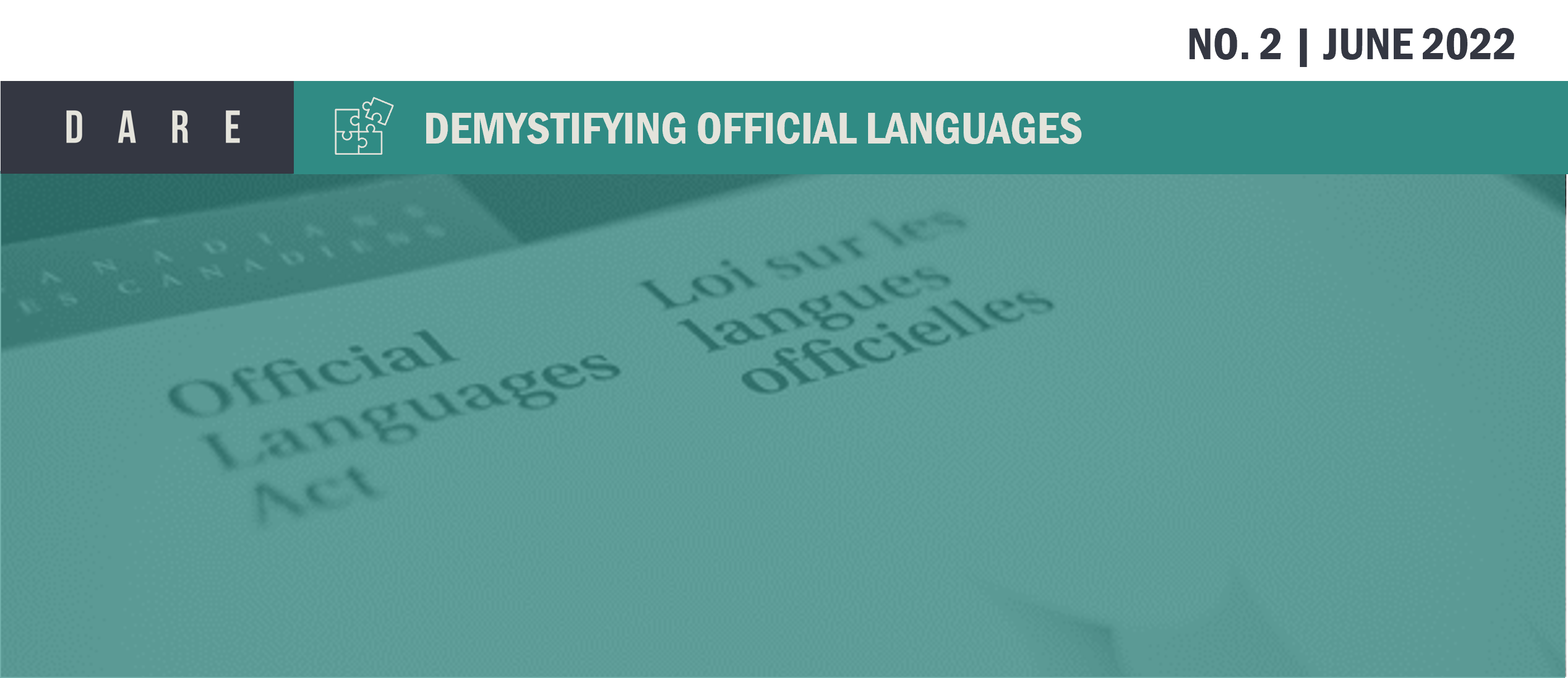CNOLC-newsletter-no2/demystifying
DEMYSTIFYING OFFICIAL LANGUAGES
The purpose of this vignette is to clarify and explain certain concepts, articles, mechanisms and roles related to official languages.
In this issue, we provide an overview of the proposed amendments to the Official Languages Act (OLA) in Bill C- 13. This overview was prepared using the placemat developed by Canadian Heritage. We also suggest some actions that official languages champions can take to prepare their organizations for the changes associated with the modernization of the OLA.
WHAT ARE THE MAIN GOALS OF THE MODERNIZATION?
The main goals are the following:
English and French enjoy substantive equality of status in Canada;
The French language is better supported across Canada thanks to:
new rights in federally regulated private businesses, rights that promote and protect the use of French as a language of service and a language of work in Quebec and in regions with a strong Francophone presence;
There is stronger support for official language minority communities, including Quebec’s English-speaking communities;
Federal institutions demonstrate better compliance with their obligations and respect rights thanks to enhanced monitoring by a central agency and expanded powers for the Commissioner.
WHAT ARE THE KEY MEASURES?
Recognition of provincial/territorial realities and existing Indigenous language rights
- Increased protection for French
- Official languages learning
- Protection for the institutions of official language minority communities
- New rights for workers and consumers – Federally regulated private businesses
- Strengthening the compliance of federal institutions
- Access to justice
- Increased powers for the Commissioner of Official Languages
WHAT ARE THE ENHANCEMENTS SINCE THE INTRODUCTION OF BILL C- 32 IN JUNE 2021?
The powers of the Treasury Board will be further strengthened, allowing for improved official languages coordination and accountability across the Government of Canada.
- The Commissioner of Official Languages will have a new power, namely, the power to impose administrative monetary penalties on certain privatized entities and Crown corporations in the transportation sector communicating with and serving the travelling public.
- There will be a more detailed Francophone immigration policy with objectives, targets and indicators, in order to increase Francophone immigration to Francophone minority communities, as immigration is a factor contributing to the demographic weight of those communities.
- The new rights in federally regulated private businesses in Quebec and in regions with a strong Francophone presence, which make it possible to work and receive service in French in these businesses, will now be introduced via a new statute.
- There will be new wording that is more explicit about the importance of Canada’s two major language communities.
- There will be better direction on positive measures to be taken by federal institutions, for the benefit of official language minority communities and the advancement of English and French across Canada.
- Wording concerning emergencies will be added to the Act in order to provide a clearer reminder for federal institutions that the rights and safety of Anglophones and Francophones must be protected even in emergencies.
- The principles of statutory interpretation will now include the principle of the remedial nature of language rights, which seeks to remedy past injustices and ensure greater protection for official language minority communities across Canada.
- Minority language education will be supported by creating a process obligation for the federal government’s commitment to contribute to an estimate of the number of children whose parents have the right to have them educated in the minority official language.
- There will be stronger provisions on court decisions that must be translated, resulting in immediate translation of a greater number of decisions issued by federal courts.
WHAT CONCRETE ACTIONS CAN OFFICIAL LANGUAGES CHAMPIONS TAKE?
Official languages champions are in a unique position to support their organization and ensure that all the required components are implemented in advance. Given the strengthened oversight powers of the Treasury Board and the Commissioner of Official Languages, it is likely that additional systematized mechanisms will be established. Therefore, preparatory work will need to be carried out in federal institutions to help support the monitoring, evaluation, and audit cycles.
For example, champions could:
- notify their organization’s executive committee of upcoming changes;
- consult with the persons responsible for official languages to assess whether the human and financial resources needed to conduct these exercises are available, and which ones will be required;
- initiate discussions with the persons responsible for coordinating section 41 of the OLA to immediately systematize the identification of positive measures.
FOR MORE INFORMATION



